Best Practices
Digital Initiative and Integration of ICT in the Teaching-Learning, Assessment and Administrative Processes
Objectives of the Practice
The primary objectives of integrating Information and Communication Technology (ICT) into the teaching-learning process and administrative functioning at MIER College of Education are multifaceted. Firstly, the initiative aims to enhance the quality of education through the adoption of modern educational technologies, thereby fostering a more interactive and engaging learning environment. Secondly, it seeks to streamline administrative and examination processes, increasing efficiency and accuracy across all operational aspects of the college. Finally, the initiative aims to position MIER College as a leader in educational innovation, both nationally and internationally, by establishing best practices in Technology Enabled Learning (TEL).
Context of the Practice
The integration of ICT in education at MIER College of Education was significantly bolstered with the establishment of the Centre for Educational Technology (CET) in 2006. This move underscored the college's commitment to leveraging educational technology as a key driver of academic excellence. The context of this practice is rooted in the evolving landscape of higher education, where digital literacy and technological competencies are increasingly becoming critical determinants of success. Against this backdrop, MIER College's strategic focus on ICT integration aligns with broader educational trends and the needs of a digitally-driven world.
About the Practice
MIER College of Education's approach to integrating ICT in education encompasses a comprehensive transformation of teaching, learning, and administrative processes. Smart classrooms equipped with digital whiteboards, LED interactive panels, laptops, and projectors have replaced traditional learning spaces. The college employs a blended learning platform based on MOODLE, augmented with multimedia resources and Massive Open Online Courses (MOOCs), to deliver a richer, more immersive educational experience. Mobile-based e-assessment tools are used to enhance students' understanding of their learning outcomes.
Administratively, the college has adopted enterprise resource planning systems to overhaul and streamline processes related to admissions, student records, and financial transactions. This digital transformation has improved accuracy and expedited decision-making. The entire campus benefits from a state-of-the-art network infrastructure and Wi-Fi facilities, supported by high-speed internet connectivity. International partnerships, particularly with the Commonwealth of Learning, have further reinforced the college's position as a benchmark for academic and technological excellence.
Evidence of Success
The success of ICT integration at MIER College of Education is evident in several areas. The dynamic and interactive learning environment has led to enhanced student engagement and improved educational outcomes. The administrative and examination processes have become more efficient and accurate, contributing to better operational performance. The college's recognition through national level EdTech awards and benchmarking by the Commonwealth of Learning for its TEL practices underscore the effectiveness of its digital initiatives. These achievements highlight the significant progress MIER College has made towards realizing its objectives.
Problems Encountered and Resources Required
Implementing ICT in education is not without challenges. Initial hurdles included the need for significant investment in technological infrastructure and training for faculty and staff to adapt to new systems. Ensuring consistent access to and the reliability of high-speed internet connectivity was critical. Ongoing resources required include maintenance and regular updates to hardware and software, as well as continuous professional development for staff to keep pace with technological advancements. Overcoming these challenges necessitated a strategic approach to resource allocation and a commitment to fostering a culture of innovation and continuous improvement within the college. In the last 5 years the college has spent Rs. 52.43 Lacs /- on the augmentation of ICT facilities.
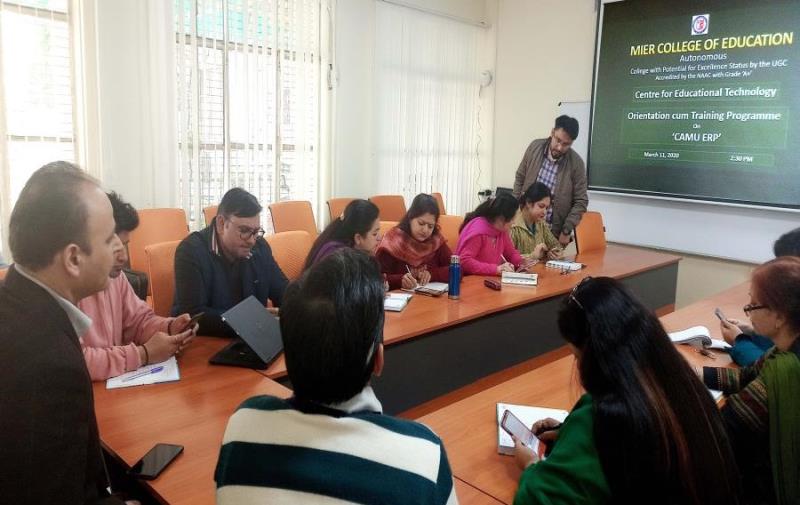
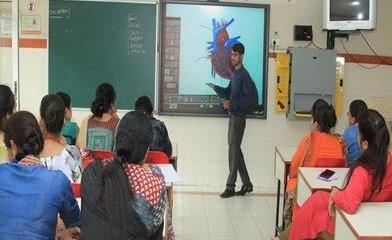
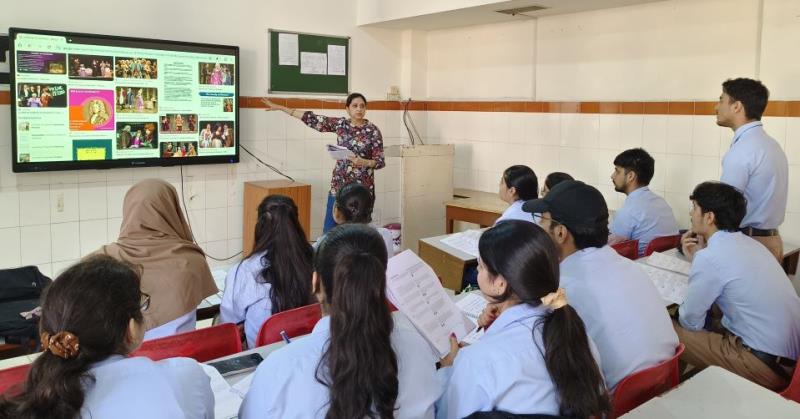
Quality Enhancement through Strengthening of Research Culture in the Institute
Objectives of the Practice
The purpose of this practice is to develop innovative and progressive approaches and practices in educational research and to bring about qualitative enhancement in the field of education. The following goals are embedded in this practice:
* Create a culture for the promotion of research by conducting innovative research activities and training programmes.
* Foster collaborations at national and international levels for greater global outreach.
* Explore opportunities for seeking external funding and grants for research projects.
* Encourage faculty and students to undertake research projects to create a positive impact and increase the visibility of the college in research circles.
* Exhort faculty members to publish research work in peer-reviewed internationally acclaimed journals.
The Context
MIER College of Education has been dedicated to improving educational theory and practice through the process of research, experimentation and innovation. With the setting up of the Centre for Education Research (CER), in 2006 as a post-NAAC accreditation measure, all activities related to educational research were brought under its ambit. The well-defined objectives of the Centre are percolated through the different research activities undertaken by the Centre to promote research studies, innovations and new trends in the field of education. The Centre for Educational Research (CER) was renamed as the Research and Development Cell as per UGC nomenclature.
The Practice
With financial assistance from agencies like UGC, NCERT, ICSSR, and J&K Govt., the Cell has completed numerous research projects and conducted international, national, and state- level conferences, seminars, workshops, and colloquia. The college also publishes a peer-reviewed international journal, MIER Journal of Educational Studies, Trends and Practices (MJESTP), which has been published since 2011.
A Research Policy has been framed by the college to create a conducive atmosphere for research and inculcate research aptitude among the faculty and students. The college holds an inter-faculty competition on preparing proposals for research projects to enhance faculty research skills. Seed money for conducting research is provided to the first three projects selected by the selection committee. The faculty also publishes research papers in journals and conferences.
The college provides incentives and financial assistance to faculty members for presenting papers at national and international conferences/seminars, organizing research colloquia, etc. Faculty and students have access to research tools like SPSS, Mendeley, AI tools, and library resources. The college encourages faculty to submit research projects to various funding agencies and has created institutional and faculty instances on the Indian Research and Information Network (IRINS).
Evidence of Success
*Research funding: The Cell received funding of Rs.4 lakhs for organizing a two-day International Conference on the theme "Building World Class Educational Institutions: Issues and Challenges" from ICSSR under the IMPRESS Scheme. The International Conference was held on August 30-31, 2019.
* A research project entitled "Role of Digital Media in Building World Class Institutions with Special Reference to Teaching- Learning: A Survey" was awarded to the college under the prestigious IMPRESS scheme of the Indian Council of Social Science Research (ICSSR) with a grant of Rs.7 Lacs.
* Ever since its inception, the Research and Development Cell has published over 67 books and journals. It has completed 29 research projects till date with financial assistance from various agencies. The college faculty has published 305 research papers in national and international journals, conference proceedings, and book chapters.
* During the last five years, the faculty has published 116 research papers in national and international journals, 39 book chapters, 90 papers presented in national and international conferences and seminars and attended over 600 online and offline workshops and webinars.
* The MIER Journal of Educational Studies, Trends and Practices is indexed with various prestigious databases including the Web of Science (WOS)-Emerging Sources Citation Index and features in the Journal Citation Report of the WOS with an impact factor of 0.30 for 2022. Eminent educationists from India, Australia, US, Turkey, Canada, South Africa and the UK are on the editorial board of the journal.
* The Cell successfully organised a NAAC-sponsored Two Day International Conference on "Perspectives in Teaching, Learning and Assessment during COVID-19 Pandemic" in May 2022.
* The College organized a one-day international conference on "Open and Digital Learning: Prospects and Challenges" on December 16, 2023.
* The R&D Cell of the college has been able to register 6 Patents as part of its research initiatives. One innovation patent was granted by the Australian Government and two by the German Patent and Trademark Office for the work of the college faculty and students. Another patent was granted by the Office of the Controller General of Patents, Designs & Trade Marks, India and two patents by the UK Comptroller-General of Patents, Designs, and Trade Marks.
Problems Encountered and Resources Required-
Problems Encountered:
* Lack of funding for research activities and research skills development of the faculty were the main problem areas.
* Lack of research skills and competency among students was another area of concern.
Resources Required:
These problems were overcome by:
* To augment the research output, the college has revised the research promotion scheme by increasing the amount given as research incentives and has also organised research awards. An amount of Rs.1,35,000/- has been given as research awards in the last 5 years. Further, the college has renewed its subscription to the N-LIST programme to access thousands of research journals and resource material.
* Research funding has been provided to the faculty through Seed Money Scheme for research projects. An amount of Rs.30000/- was paid under the Seed money grant scheme.
* Plagiarism detection software DrillBit was purchased at the cost of Rs 30, 000/-which is in the form of an annual subscription.
* A number of trainings, orientations, and workshops were organised for the faculty on the use of AI in research and the latest software for data analysis, review of literature and reference management.
* Research competitions have been organised to select students for the Research Mentorship Programme. Under the guidance of their mentors, the selected students were able to learn the skills and process of conducting research and have developed research papers.
* Dr. Arun K. Gupta Research Award has been instituted to encourage students to undertake research. The award money, mentioned below, shall be given to the selected students based on the overall quality of their research work. Ph.D. (Education) Programme: Rs. 25,000/- M.Ed. Programme: Rs.15,000/- M.A. (Education) Programme: Rs. 15,000/-
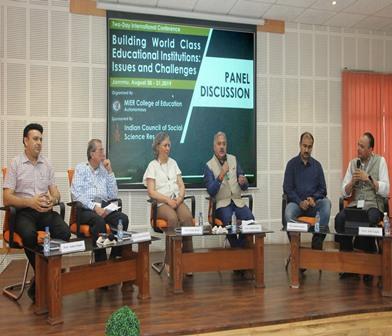
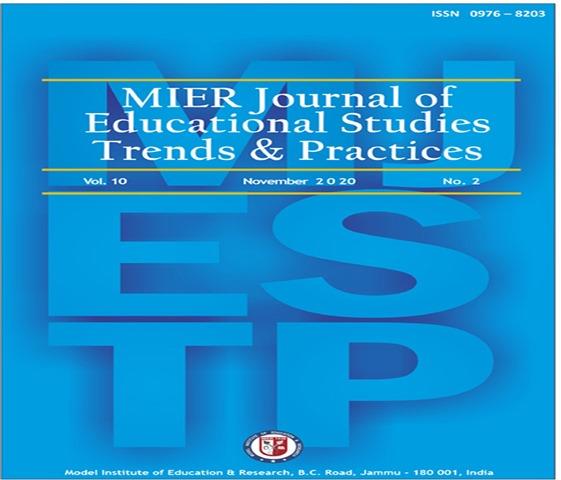
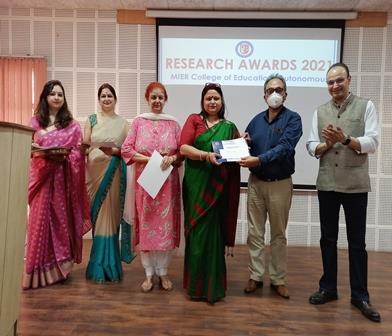
Gender Sensitisation and Empowerment of Women
Objectives of the Practice
The best practice aims to:
1. Provide a safe and gender-friendly environment where both boys and girls, men and women coexist cohesively.
2. Lead to the sensitisation of both genders and empowerment of young women by providing them with strategies to attain sustainable goals for personal, professional, social and self-development.
3. Create further awareness and sensitisation by our students in their homes, communities, workplace and society as a whole as adults.
4. Create a gender-neutral society where individuality and meritocracy are the only parameters for progress and growth.
The Context
Ever since its inception in 1981, the College has been rendering valuable service for the emancipation and empowerment of women. The College community felt it essential to have a dedicated centre that would provide more opportunities for empowering women through gender-specific programmes. It started a centre of Women Development and Studies and showcased its activities through a quarterly newsletter “Nurture” which was supported by the UNICEF for the Anganwadi and other functionaries in Jammu and Kashmir. Smt. Shanti Gupta Centre for Women’s Studies was established in 2006 as a post NAAC accreditation initiative and stands recognised by the University Grants Commission (UGC). It provides a formal platform to study, understand, and develop strategies to resolve the pandemic issues concerning women in our society. The institution envisions the transformation of this centre into a full-fledged school of women’s studies offering academic, research, training and allied programmes for women empowerment and development utilising diverse technologies and delivery systems.
The Practice
The Centre has organized gender sensitization programmes, capacity building workshops, extension and outreach programmes, counselling sessions and workshops for youth and women. It has established linkages between individuals and agencies at local, national, and international levels for networking, resource sharing, and collaboration for empowerment and development of women. Voicing concern about women and their rights viz-a-viz violence, exploitation, and harassment through wall magazines, poetic meets, advocacy campaigns, special lectures, interaction sessions, street plays and multi-media presentations highlight some of its achievements. The Centre is working not only for the protection of women’s rights but also addresses issues related to gender equality. As per recent UGC guidelines the Centre for Women’s Studies, launched its students’ wing called “The Gender Champions Club”. Two nodal teachers and 23 members of the club actively conducted awareness cum orientation programme sensitising the students about gender issues and concerns. They also made an annual action plan for organising various awareness programmes/ seminars/workshops and interactive sessions. The Principal along with the Director of the Centre, the nodal teachers and the members of the club are responsible for the implementation of the programmes in collaboration with the NGOs, Government officials from the department of social welfare, health, women and child welfare and judiciary. The college has created a niche for itself by transforming and empowering students who come from diverse backgrounds. It nurtures and helps to facilitate self-growth, self-worth and actualization of potential of the students of both genders through myriad ways of empowerment and competence building.
Evidence of Success
The College’s vision of creating an inclusive learning community has led to the success of young students in establishing themselves in the global arena in terms of service to society. The following are some indicators of the success:
a. The Centre has published a book on Women Achievers of J&K and research projects based on themes like women’s aspirations, their attitude towards technology, decision- making abilities and development of life skills. Besides, an annual newsletter highlighting different activities has been brought out regularly.
b. The College has formulated and implemented anti ragging committee, prevention of sexual harassment at work place (POSH) and grievance redressal committees in accordance with the UGC guidelines. This has enabled the college to create a safe and friendly environment for its students and women employees.
c. The College has been able to retain its women faculty over the years and they have experienced social upward mobility in their careers. The women workforce have attained decision-making positions in the organisation.
d. A strong network of women academic leaders has been created which has generated a pool of women capable of handholding young women, both students and working professionals.
e. Video clippings, photos, media reports, annual newsletter, publication of research studies and books are the documentary evidence maintained by the Centre.
f. The Gender Champion Club has been actively involved in several activities. They planned and coordinated a 16-day activism campaign called UNiTE on the occasion of the “International Day for Elimination of Violence against Women and Girls. They organised and participated in a discussion on cybercrime, cyberbullying, and eve-teasing organized for the students at Model Academy School. The gender champions also participated in an awareness program on "menstrual health and hygiene" organized for local community members.
g. The Centre is coming up with a book, Women Empowerment: Achieving Sustainable Development Goal 5, a proposal of which has been accepted by Springer Nature publisher, Singapore. The book would bring contributors from India, Australia, the USA, and New Zealand together to share their own perspectives, experiences, practices, capacity building and empowerment models making it a valuable resource for professionals and practitioners in the field. The institution has identified major changes in the awareness level, heightened sensitivity towards gender equality, positive attitude, freewheeling with faculty and other students on various parameters.
Problems Encountered and Resources Required-
Some of the challenges encountered were the implementation of the annual plan and its monitoring in view of the tight academic schedule, organisation of various programmes during working hours, lack of support from external agencies, need for better networking amongst institutions, and lack of financial resources to mention a few. Though there are many challenges but they have been circumvented to create long-term benefits and success stories which are heartening indeed.
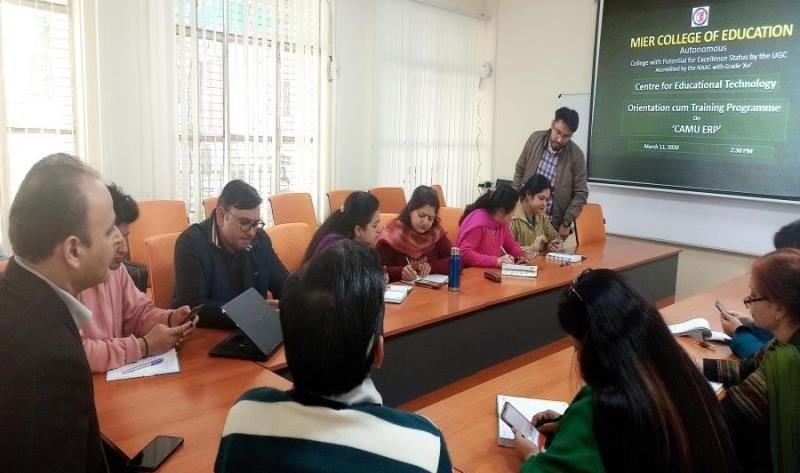
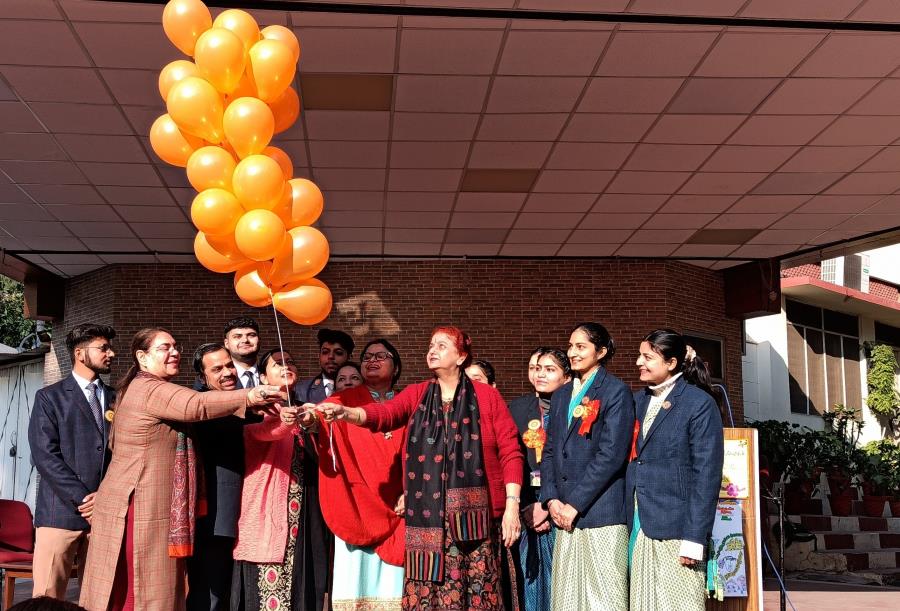
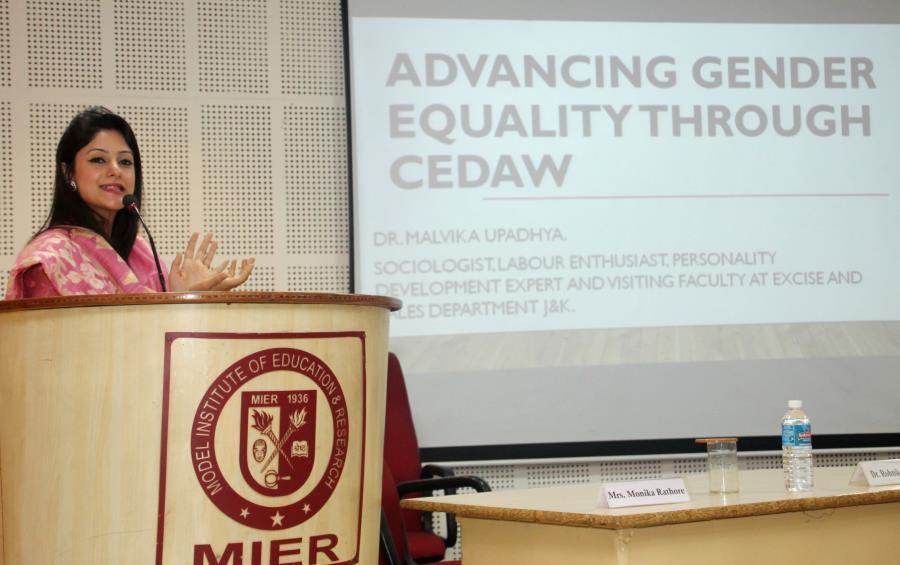
Best Practices 4
Best Practices 4


